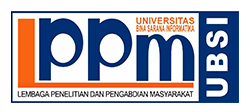STRATEGI KOMUNIKASI PEMASARAN DALAM MEMPERTAHANKAN EKSISTENSI RADIO DANGDUT TERDEPAN DI JAKARTA (Studi Kasus Eksistensi Radio Cbb 105,4 Fm)
Abstract
Competition within the radio industry experienced significant growth, Radio CBB FM is a dangdut radio pioneer Jakarta, which aired from 1970 to (2015), is not an easy matter for Radio CBB FM maintaining the existence of advanced dangdut radio in Jakarta for 44 years with the dangdut music program and In 2015, beside getting award from KPI of the best radio program category about Jakarta, get a rating positioned to 7 of 95 radios in jabodetabek level. A theoretical approach in this study is the concept of a broadcast program strategy, Schultz which includes three elements of marketing Integrated Marketing Communication (IMC), namely: (market structure) market structure, market conduct, (market behavior) and market perfoamance (market performance). This study uses a case study with a qualitative approach and using the paradigm of post-positivisme. Data collecting technique is done through observation, in-depth interviews with the director, program director, Marketing, and Promotion CBB Radio 105.4 FM. The results showed that in order to attract listeners as much as possible so that it can raise the rank or rate, Radio CBB implement the strategy. The strategy program is intended to maintain the listener to not switch to another channel. Promotion conducted by CBB is to perform on-air promotion, off air promotion, and cross promotion. In marketing the radio program CBB apply integraded Marketing Comunictio. IMC focuses on radio listeners and advertisers, marketing channel with the ultimate objective for the benefit of the audience.
Keywords: Marketing Communications, Program Strategic, Dangdut Radio in Jakarta.
Full Text:
PDFReferences
Albaran. (1996). Media Economics (Understanding Market, Industries. ConceptLowa State University press
Arumon.(2013) why Sosial Media Need Conventional Media. Jakarta: Kelompok Media SWA
Becker, B. w. Connor, P.E. (1982). Personal values of Heavy Userof mass Media Journal of Advertising Research
Denzim, N. (2009). Handbook of Qualitative Research. USA: Sage Publication
Dwyer, tim (2010). Media Covergence: Issues in Cultural and Anfedia Studies. London: Open University Press. McGraw-Hill Education
Echlos, John M. and Hassan Shadily (1975 )An English-Indonesia Dictionary. New York: Cornell University Press
Efendy, O. U. (2003). Immu. Teori dan Filsafat Komunikasi. Bandung: PT. Citra Aditya Bakti.
Einstein, M. (2004). Media Diversity: Economics, ownership, and the FCC. New Jersey: Lawrence Earibauma Associates publishers.
Furchan, A. (1992). Pengantar Metode Penelitian Qualitative. Surabaya Usaha Nasional.
Gough, H. (1976). Planning Producing Presenting the Radio Programme. Kuala Lumpur: Asian Institut For Development.
Gumala, F. P. (2012 )Strategi Bisnis Media Studi Kasus Radio 987 Gen Em Jakarta. Jakarta: Tesis Universitas Indonesia.
Head, S. w. (1982). Broadcasting In America; A survey of televisio Radio and New Technologies. Boston: Hougton Mifflin Company.
Jantsch,John. (2009). Let talk about Social media for business. New Jersey:Pearson Prentice Hall.
Jenkins, Henry. (2006)Convergence Culture: Where Old and New Media Collde New York: NY University Press.
Kansong, U. (2009). Ekonomi Media. Jakarta: Ghaina Indonesin.
Kotler, P (2003). Manajemen Pemasaran Edisi Bahasa Indonesia, Jakarta:PT Indeks Kelompok Gramedia.
Lawson Karen 1999. Involving Your Audience, making it Active. Boston Allyn dan Bacon
Levin, Harry L. Giltespie. Robert w. 1992. The Used on Radioin Family Planning. Oklahoma City: World Neighbours.
Masduki. C20 04 Meniadi Broadcasting Profesional. Jogjakarta: Pustaka Popular LK is
Morisson. (2005) Media Penyiaran Strategi Mengelola Radio dan Televisi. Tangerang: Ramdina Prakarsa,
Mc Connel dan Bruce(2005) dalam Fu Wayne C20O3 D Applying the structure- onduct-Performance framework in Media Industry Analysis INMM- The International Journal on Media Management vol 5 no IV Nanyang Technological University, Singapore
Nielsen. (2015). Nielsen Newsletter March Edition. Jakarta: Nielsen Indonesia.
Noor, F. H. C20IO). Ekonomi Media. Depok: Raja Grafindo Persada.
Nugroho, Y. C2012 Mapping the landscape of the media industry in contemporary Indonesia, Jakarta: Centre for Innovation Policy and Governance.
Palupi, D. H. (2013). Menjawab Perubahan Lanskap Periklanan Indonesia. Jakarta: Kclompok Media Swa.
Patton, M. Q. (1991). How to Use Qualitative Methods in Evaluation. London SAGE Publications.
Picard. (1989). The Concept and Role of the Market in Media Economics. New York: Fodham Univ Press.
Siregar, A.e (2010). Potret Manajemen Media di Indonesia. Yogyakarta : Total Media.
Triartanto, I. Y.(2010) Broadcasting Radio Panduan Teori dan Praktek Yogyakarta: Pustaka Book Publisher.
W.creasWell J- (1998). Qualitative Among Fivc Tradition. Inquiry and Research: Design: Choosing London: SAGE Publicati
Yin, R.K (1989).Case Study Research Design and Methods. Washington: COSMOS Corporation
DOI: https://doi.org/10.31294/jkom.v8i1.2116
| Index by: | ||








|
||
| E-ISSN: 2579-3292 | ||

 https://road.issn.org/sites/all/themes/customroad/img/road-issn.png
https://road.issn.org/sites/all/themes/customroad/img/road-issn.png
|
||
Dipublikasikan oleh LPPM Universitas Bina Sarana InformatikaJl. Kramat Raya No.98, Kwitang, Kec. Senen, Kota Jakarta Pusat, DKI Jakarta 10450
|








